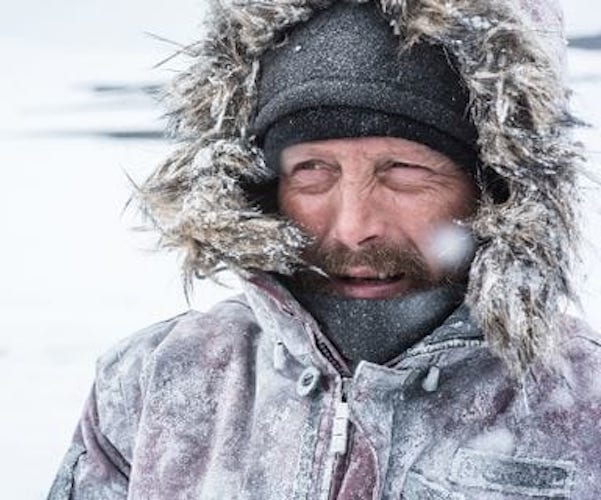Film Review: “Arctic” — An Icy Thriller
By Peg Aloi
Arctic avoids existential symbolism for the sake of expressing authentic emotions, most of them thanks to Mads Mikkelsen’s performance, a quiet tour de force.
Arctic, directed by Joe Penna. Screening at Landmark’s Kendall Square Cinema.

Mads Mikkelsen is a man in danger of freezing to death in “Arctic.”
This harrowing story of survival set in the Arctic (but filmed in Iceland) is a stunning feature debut from young Brazilian director Joe Penna. Arctic stars Mads Mikkelsen in a narrative that’s mostly devoid of dialogue, but still full of action and suspense. Similar movies that dramatize survival via the battles of men alone against the elements (like All is Lost, starring Robert Redford as a guy sailing a small yacht damaged, accidentally, by huge shipping vessels) don’t usually include such an insidious and constant threat — freezing to death within minutes. Recent tragic deaths, attributed to conditions caused by the recent polar vortex weather in the United States, may stir unexpectedly sympathetic vibes in some viewers.
Mikkelsen is Overgård, a pilot living in a makeshift camp in a desolate area of the Arctic where his plane crashed. The opening shots feature close ups of him patiently digging beneath two feet of snow in order to expose the black rocks beneath. The camera pulls back to show SOS in enormous letters; this moment of shocking clarity suggests just how much time and effort must have gone into making this call for help. It’s not clear how long he’s been there, but he has a significant growth of beard and the picture on his license is clean shaven. His survival skills are impressive: he has come up with a makeshift set-up for ice fishing and there’s a box full of frozen raw fish. He has two middle toes missing, but the flesh is completely healed — was this due to frostbite? Is the toe loss recent or from a previous misadventure in the Arctic? Such invitations to speculation may be part of why this film becomes so compelling, even fascinating, to watch.
On some level, it hardly matters how this pilot got where he is; the specter of immediate danger, and awareness of imminent death by exposure, provides crushing dramatic tension. Overgård is smart and cautious, but also seems weary and worried at times. Mikkelsen’s perfectly-calibrated facial expressions are convincing, both in terms of conveying physical breakdown and psychological pain. For an actor whose roles have included an array of ambitious dramatic characters, it’s hard to recall when he has been better.
One looming source of danger is an large and always hungry polar bear. The beast ransacks Overgård’s store of frozen fish; he seems to gaze at the man across a half mile of frozen tundra, its huge bulk visible on the barren snowy plain. Such moments of threat, emanating from nature’s most imposing vistas, benefit greatly from the heart-stopping photography of Icelandic cinematographer Tómas Örn Tómasson.
A helicopter arrives, filling Overgård with passionate relief, but it crashes in the midst of a storm, leaving all of its crew dead, except for a badly injured woman (Maria Thelma Smáradóttir). He is Danish, she is Thai, and they can’t communicate. Overgård does his best to tend her wounds and, using gentle words and manner, to keep her calm. He finds supplies in the helicopter, including a small propane stove; this simple gift of heat for warmth and cooking is, for these destitute people, the holy grail. He finds some basic foodstuffs and, unable to wait to cook them, munches on some raw ramen noodles, enjoying the first food — other than raw fish — he’s eaten in weeks or perhaps months. This is a decadent feast. He catches a large arctic trout and happily tells his new companion about it; he feeds her soup made with the fish and noodles. These simple comforts, and the warmth of human company, give Overgård the energy and hope he needs to face what’s coming next.
Given the woman’s injuries, his lack of medical supplies and, of course, the patient bear, Overgård decides to try to move the woman to a seasonal shelter, a journey that will take several days over hazardous terrain. As her condition worsens and the weather closes in, things look worse and worse for them by the minute. Overgård’s strength and perseverance can only take him so far. Brief moments of human compassion, in the midst of extreme hardship, become deeply moving. But the film never becomes sentimental, resorting to cheap emotional ploys through music or manipulative editing. It is tempting to find some larger message here about isolation and compassion — human drama unfolding in nature’s vastness — but Arctic avoids existential symbolism for the sake of expressing authentic emotions, most of them thanks to Mikkelsen’s performance, a quiet tour de force. This is a white knuckle ride in a white-on-white landscape until the very last moment.
Peg Aloi is a former film critic for The Boston Phoenix. She taught film and TV studies for ten years at Emerson College. Her reviews also appear regularly online for The Orlando Weekly, Crooked Marquee, and Diabolique. Her long-running media blog “The Witching Hour” can be found at at themediawitch.com.
